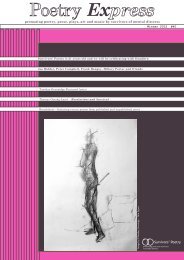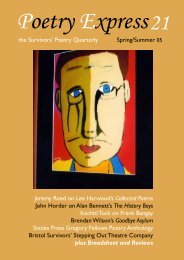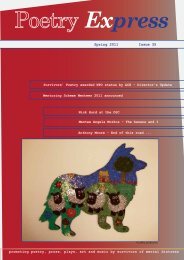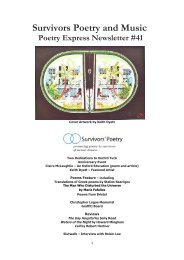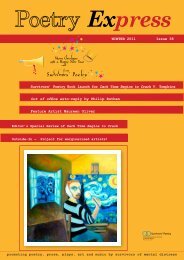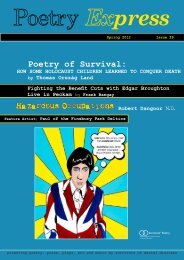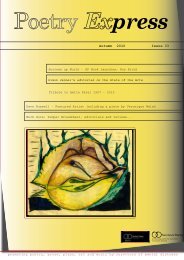Download - Survivors Poetry
Download - Survivors Poetry
Download - Survivors Poetry
- No tags were found...
You also want an ePaper? Increase the reach of your titles
YUMPU automatically turns print PDFs into web optimized ePapers that Google loves.
It was gentle then but now we are really wet and youdon’t seem to have noticed.At my shoulder are my Grandmas and behind them,their Grandmas.They stand, a long line of women getting wet on streetcorners.None of us are dreaming of stairs.”She concluded with Agnus (lamb); some moving lines:“All winter I wear black . . . trees under our pavementsare dead . . . fragrant lamb, give us peace.”Tobias Hill made the initial statement that poetry is‘more of an inclination for musicality’. He read from hisforthcoming novel which has the provisional title of WhatWas Promised. This was based in London from 1948 intothe Fifties, with all the ethos of World War II austerity,including ration books. This was the time when the worksof George Orwell were available at ‘threepence a read’.He also read from his Nocturne collection, starting witha quote from Emerson: “Cities give us collision”. Heconcluded with pieces from his sequence of 12 poems– one for each month. He made a specific reference tothe Coronation, and referred to the ‘duppie’ market inWatney Street. This to him, was a place of redemption:“no–one is out of place here.” His November poem refersto a firework display, which echoes the Blitz: ‘gunsechoing through the fog, fireworks at night, rocketsfalling in the river’.Iain Sinclair referred to ‘Psychogeography’. Like TobiasHill, he said that poetry is a memory system, which canbe put ‘into a structure of musicality’. He began witha resume of his journey through Oregon and Washingtonin the States. During this, he took a long walk, where hewitnessed ‘ancient, eloquent trees – of epic immensity’.The found a logging town there. On his return to London,he reiterated his pattern, made a walk of comparablelength through Hackney. An important landmark for himwas the village of Helpston near Peterborough, famous forits garden centre, which he associated with ‘stations andwar and brass bands’. He described is as ‘a microclimateof suspended anxiety, leaving an older self behind, non–denominational places of worship. Most of his contributionconcentrated on the London metropolis. Some of this isterrifying: ‘apocalyptic killing fields . . . city shudders . .. arranged obelisks . . . the death camps of the future’.There is, for him, a ‘mood of communal hallucination,an intoxication with blood and flag rhetoric – stillunappeased psychic damage.” Iain maintained that theT S Eliot Waste Land zombies were part of the ‘necessaryritual of convalescence’, but complained of ‘unnecessaryrealism’. The river motif arose again, this time theFleet river. Thomas Hardy had worked near there as anarchitect; Shelley met his Mary in a nearby graveyard.He also read brief extracts from Blake’s Jerusalem andRimbaud’s Illuminations, followed by part of his ownKing’s Cross essay (Fallujah London) from London, City ofDisappearances (Hamish Hamilton, 2006). A major focusthis evening was on the King’s Cross vicinity. St. PancrasOld Church is for him evocative of Blake’s Jerusalem. Iainhas some attachment to Royal College Street – in whichthe house where Rimbaud and Verlaine resided his beenpreserved as an Anglo–French Cultural Centre, feeling alsothat a ‘Rimbaud coda’ had been imposed on much recentLondon architecture. He found the Euston arch was ‘anattempt to rewrite mistakes of the past’. In an extractfrom his unpublished book Ghost Milk, he expressed somereservations about the venue in which he was performing:“ ...Twenty minutes inside King’s Place ... was the outerlimit of human endurance. There is a low–level electronichum, enough to keep the nerves on edge, before stokingthem with a caffeine hit ... Temperature is cranked upthat notch too high: the building doesn’t need you, keepmoving ...”He referred to complexes 20 times as vast as Hamptoncourt, where ‘scale is annihilated’. Stadia can be‘spaceless’, moving ‘away from geological absolutes’. Theaudience was treated to an extract from his forthcomingbook Ghost Milk, (to be published July 2011).Elaine Feinstein opened with Wartime Leicester. Sheremembered this time as being quite exciting: thestreetlamps going out at night, electric sparks from thetrams, air raid drill at school, nibbling raisins and chocolateblobs. It was a time of growth and enlightenment: “herchrysalis conceals the girl I am.”She talked of going up to Cambridge in 1949, the firstyear after which is had become possible for women totake the Tripos. The place seemed really exotic to her atthe time. It had variegated cultural strands: she spokeboth of wartime dance bands and madrigals, Soho JazzClubs and Raymond Chandler. She was initially veryChristian and pious, but then came to read Donne andHerbert. Initially, the secular world was denied. But thena Fulbright student (American?) in her words, ‘rescuedher with mockery’, made her appreciate the sad eroticbeauty of an ancient culture; he taught her new truths inthe shades of willow trees.Elaine proceeded to describe her sojourn in Paris,then the centre of the Bohemian literary world. Thereshe discovered her fascination for Edith Piaf, with her‘Dietrich eyebrows’, who inspired the poem Piaf inBabraham : ‘the glamour of a woman who never hadsafety to lose’, who ‘learned to sell her ordinary life forapplause’.Later she went to Budapest, under the auspices of theBritish Council; this experience ‘drew 3 novels from me’.While she was there, Hungary was still in the grip of theSoviet authorities. This period inspired Budapest lyric2, and Prague. In Budapest, the Turks had whitewashedthe frescoes. She was fascinated by the ‘night life’ ofthose locations, ‘the pink–lipped past of velvet drapes. . . enchanted unfamiliar world . . . permissive shabbysplendour. The remembered the cuisine, containing toomuch pork and seasoned with paprika. There she wasturned on to Eastern European writers like Polinsky Janov(translated by Ted Hughes). A very powerful indictmentof cruelty and oppression in Persecution: “His parchmentface, fleshless lips shrewdly curved – men harnessed to acart to watch an execution . . . he longs for the lord tobury him in his embrace.”She also read two poems from Talking to the Dead:Widow’s NecklaceFriends try my stories on their teeth orwith a match: are they plastic or amber?My children say I must have forgottenhow I used to turn to them so very often,36



